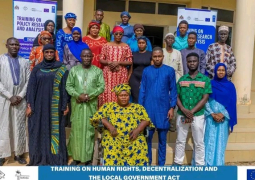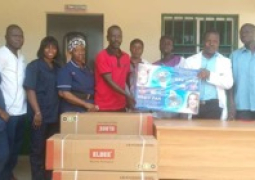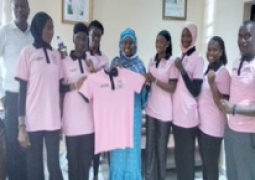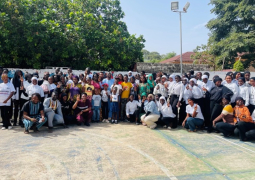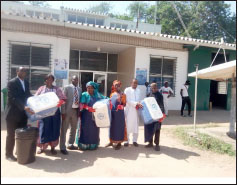
The gesture includes 250 cooler boxers, 152 gloves, 152 knives, 152 aprons, 152 buckets and 152 tarpaulins. It aims to help people working in the fishing industry to preserve their fish and products.
A catch assessment survey of 2018, 2019 and 2020 indicates that The Gambia’s overall fisheries production followed an upward trend from 71,926.93 tons in 2019 and 78,157.72 tons in 2020.
Artisanal fishing accounted for almost 71% of the entire catch in 2019 and 2020, of which over 80% came from the Atlantic Ocean and the reminder from inland waters.
Fish is highly susceptible to deterioration without any preservative or processing measure, and due to its chemical composition, fish is a perishable food material, and its flavor and texture change rapidly during storage after capture.
Representing the Minister of Fisheries and Water Resource, Ahmed Tijan, principal assistant secretary at Ministry said excessive perishes of fish and fisheries products through post-harvest losses is one of the greatest challenges of fisheries sector in the past 50 years.
However, the project, he said, is essential to the use of fish to improve nutritional standards of the population, thereby increasing employment opportunities as well expanding Gambian participation in the fisheries sector.
“The project is therefore a direct complement to what we are aiming at and I’m hopeful that it will also have synergy with our development actions,” he said.
Momodou Sidibeh, deputy director of Department of Fisheries said investment in the reduction of post-harvest losses remain central strategy of policy area of post harvest and quality control as recommended in the National Development Plan and fisheries and aquaculture policy.
“Post- harvest loses have a profound adverse impact on fishing communities whose status and income often depend on post-harvest activities. Such loses also have a detrimental impact on the socio-economic life of fishing communities and reduce the amount of animal protein and income available to a large segment of the population,” he said.
Director Sidibeh said The Gambia government through the Ministry of Fisheries and Water Resources continues to give high priority attention to rational and sustainable development of the fisheries sector. This sector, he said, supports close to half a million people directly and indirectly.
“This sector has an important role in the socio-economic development of the country. The overall importance of the sector cannot be over emphasised especially as it relates to employment creation particularly for Gambian youths including women, generation of revenue and foreign exchange earnings, contribution to food and nutrition security, and poverty alleviation,” he said.
Representing FAO country rep, Dr. Mustapha Ceesay, FAO country director said the project is designed to strengthen the capacity of fish processors and traders especially women, through the production of high-quality fish products using the newly introduced smoking oven to provide cold chain equipment to improve food security and income opportunities for women fish smokers.
Those materials, he continued, would enhance women’s application of best practices in fish handling, processing, and marketing and added it would translate into improved quality and safety of the different fishery products produced by operators and help to prevent waste and post-harvest fish losses.
Fatou P. Choye, president of National Association for Artisanal Fishing Operators commended FAO and the Gambia government for the gesture.


